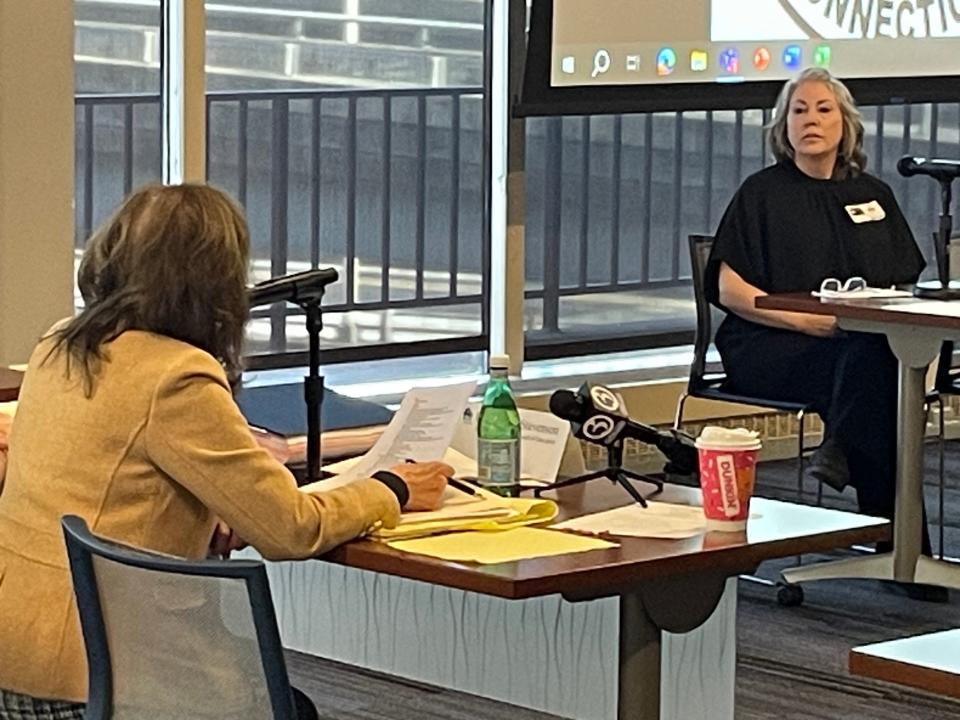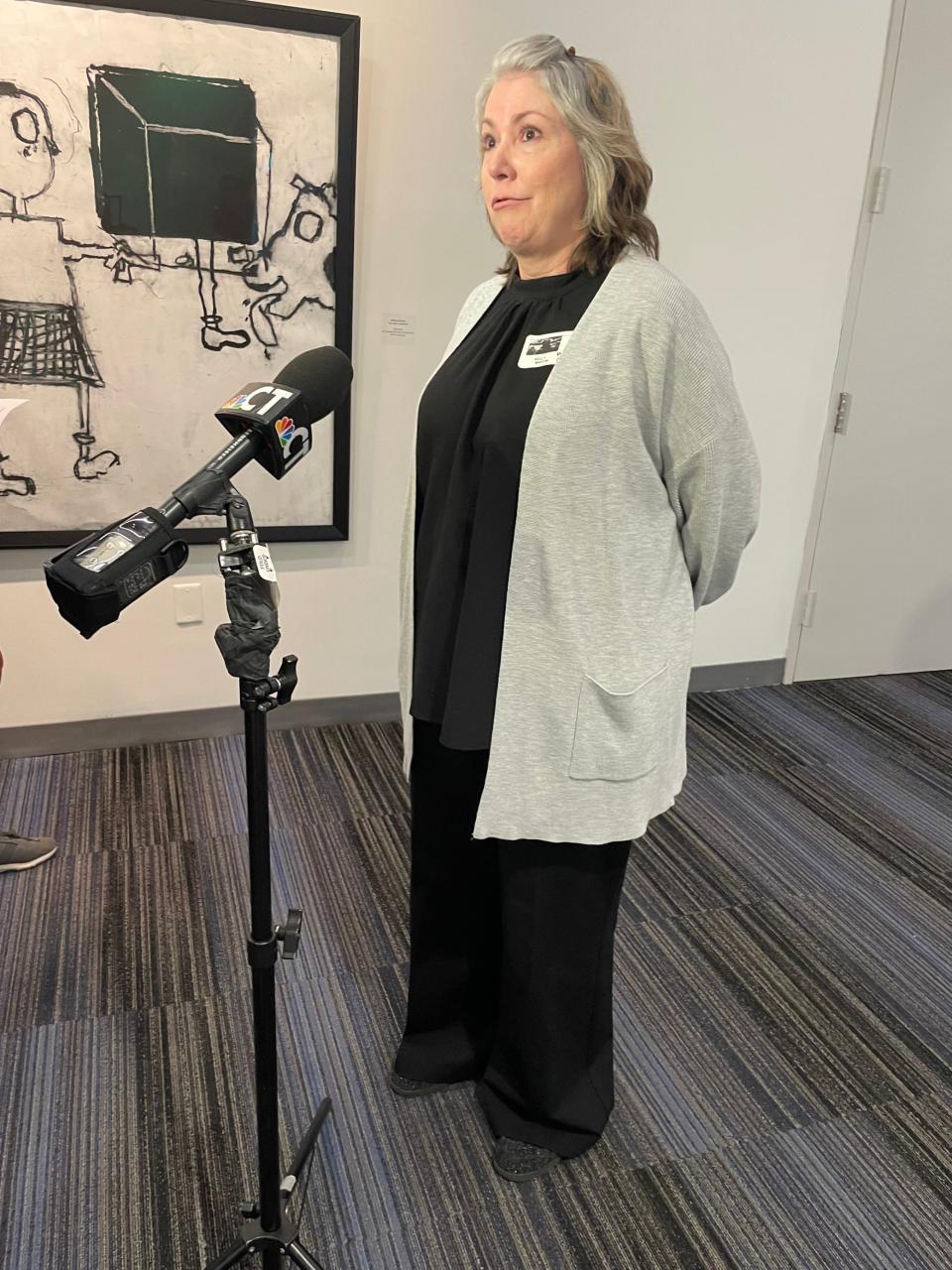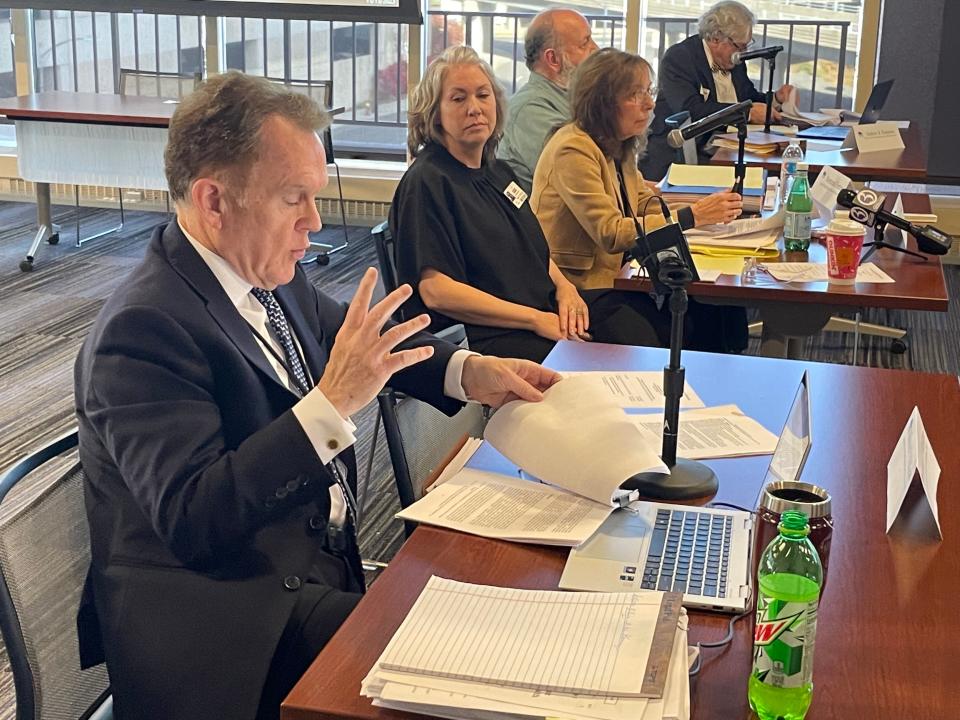"We could have worked this out two years ago” Killingly BOE at state hearing Wednesday
The Killingly Board of Education maintains it is doing everything it can for its students.
An impartial hearing was held Wednesday for the State Board of Education concerning the Killingly Board’s ability to provide adequate mental health services to its students, per a 10-4b complaint filed with the state by Killingly parents in April 2022, due to turning down grant funding for mental health services.
Wednesday's session was the first of three sessions scheduled, during which the Killingly Board of Education presented its case first. The next sessions are scheduled for Nov. 30 and Dec. 13.

The hearing
Before the hearing started in earnest, the Killingly Board’s attorney, Deborah Stevenson, raised issues with how the state proceeded through the process. She claimed that the Killingly Board needed to present its proof of mental health services first, instead of addressing the complaints first. Stevenson also claimed the state has been unclear in communicating with the Killingly Board on what needs to be done.
While Killingly Board members Norm Ferron and Kelly Martin, both Republicans, were seated by Stevenson during the hearing, only Vice Chair Martin spoke during the hearing. Ferron, the current chair, lost his bid for reelection last week. Killingly Superintendent Susan Nash-Ditzel also spoke during the hearing. Both Martin and Nash-Ditzel were asked questions by Stevenson, Connecticut State Department of Education Legal and Governmental Affairs Director Mike McKeon, and Attorney Andrew Feinstein, who represents the families and residents who filed the complaint.
Martin's testimony
Martin repeatedly said that the Killingly Board believes that student mental health needs have been met before the pandemic and after. She also said the board heard no complaints from staff or students about the district's ability to provide those services. She was aware of the universal increased need for student mental health services from the pandemic, and aware of a survey on mental health that was sent to students.
The choice to pursue another provider other than Generations Family Health Center came down to seeing online reviews, and the other providers, then Community Health Center, Inc., and now Community Health Resources, having both better online reviews and requiring parental opt-in for treatment, as parents need to know what’s going on, Martin said.
“I’m sure there are amazing people in the Generations organization, but they didn’t have the best reviews online,” she said. “CHR had better reviews, and that makes a big difference.”
For students that aren’t able to get a parental opt-in, they can still go to school counselors, who have the same degrees as CHR personnel, Martin said.
While Feinstein pointed out to Martin that Generations still mentioned parental opt-in, Martin said she saw a form from CHC for that purpose.
Martin also criticized the opposition’s insistence on using Generations as the mental health services provider, to the point where CHC decided to back out to protect its reputation, and could have provided mental health services months earlier. Multiple parties, including community members, Feinstein, Democrat Killingly Board Member Susan Lannon and local media spread misinformation, she said.
“When you hear something for two years over and over and over, it becomes your truth,” she told the press during a break. “I don’t blame people for being passionate about their children one single bit.”
Martin also told the press that the issue could have been resolved between the district and the state a long time ago. Martin also acknowledged the Killingly Board should have communicated their intent to find a replacement for Generations sooner than they did, she said.
Martin also told The Bulletin she agrees with Stevenson that the state hasn’t been clear with what they want from the Killingly Board.
“If we got the answers we needed, we could have worked this out two years ago,” she said.
The current provider, Community Health Resources, was approved by the Killingly Board in the spring. It started providing services with a half day each at Killingly Intermediate School and Killingly High School. It has since expanded to three days of service at both schools, meeting the need as it comes, Martin said.
Superintendent says district has ways to address student needs
When Nash-Ditzel spoke, she also said the district has been able to consistently provide for mental health needs, and hasn’t heard any complaints either.
Nash-Ditzel said other issues, like bullying and absenteeism, are related to student mental health. The district has anti-bullying policies. As for absenteeism, the district had seen a slight increase in chronic absenteeism last year, but due to a new attendance program that includes tracking systems, making sure students make the bus, and home visits with families, chronic absenteeism is down by 11%. The district also held an event for local families to encourage attendance on Wednesday, she said.
Nash-Ditzel also spoke about different ways the district accommodates for student needs, using a tiered system to determine what is needed.

Concerns about Killingly Board's approach
Christine Rosati Randall, one of the parents who initiated the complaint, said some of what Martin presented was vague. As for Stevenson’s claim on the state not being clear, Rosati Randall felt the state was being clear with what it was looking for, per the Nov. 2, 2020 report, she said.
Rosati Randall was also concerned about Martin’s use of online reviews in favoring other providers over Generations, as there were “very positive” reviews of Generations’ time in the Putnam Public Schools district, serving students, and even a Putnam Board of Education member. There was also plenty of positive data about Generations’ nine years in Putnam, she said.
“Are we using Yelp to determine the credibility of a mental health provider?” Rosati Randal said.
While Martin said information on the current mental health provider was sent home to parents to two parts, first over the summer to students with the most need, and then to the rest of the families at the start of the school year, Rosati Randall said she never got this information.
“It sounds like students were hand-picked,” she said. “She never explained what the criteria was, or who was responsible for that.”
Former student comments
Julia Revellese also attended the hearing. The college sophomore was a Killingly High School student in 2018 and 2019, before transferring to another high school. She said there was a “dire need” for mental health services in her time at the school.
“I can’t imagine how bad it must be now, post-pandemic, and these students are still crying for help and not receiving any help,” Revellese said.
It’s important for all students to have full access to mental health services, regardless of parental consent. Parental consent can be a barrier for some students if it’s something they aren’t comfortable talking to their parents about, or their parents aren’t supportive of mental healthcare, or if the parents are abusers, Revellese said.
“It’s not an issue for me because I luckily had parents who were able to bring me to therapy, but there are some students who don’t have that, and they’re still struggling,” she said.
After the meeting, State Board of Education Vice Chair Erin Benham, who lead the hearing, declined to comment on the day’s testimony.
Rosati Randall hopes students will be able to get the support students need, and she will continue to be vocal until that is achieved, she said.

Killingly Board meeting after hearing
The Killingly Board of Education met later Wednesday evening for a regular meeting. While there was nothing said directly related to student mental health, Martin made a short goodbye speech for Ferron, as it was his last regular Board of Education meeting. Martin thanked him for his service as both a veteran and as a Board of Education member. People only got to see the frustrated side of Ferron in the past couple years, where Martin knows him as a funny person and a friend, she said.
“The last couple of years have been difficult on you, and I’m sorry for that,” Martin said. “I know the other side of you, and I know you’re an amazing person.”
Ferron responded by saying there’s been amazing progress in his years on the board, and he hopes it continues.
This article originally appeared on Gardner News: Killingly BOE defends itself at state 10-4b hearing

